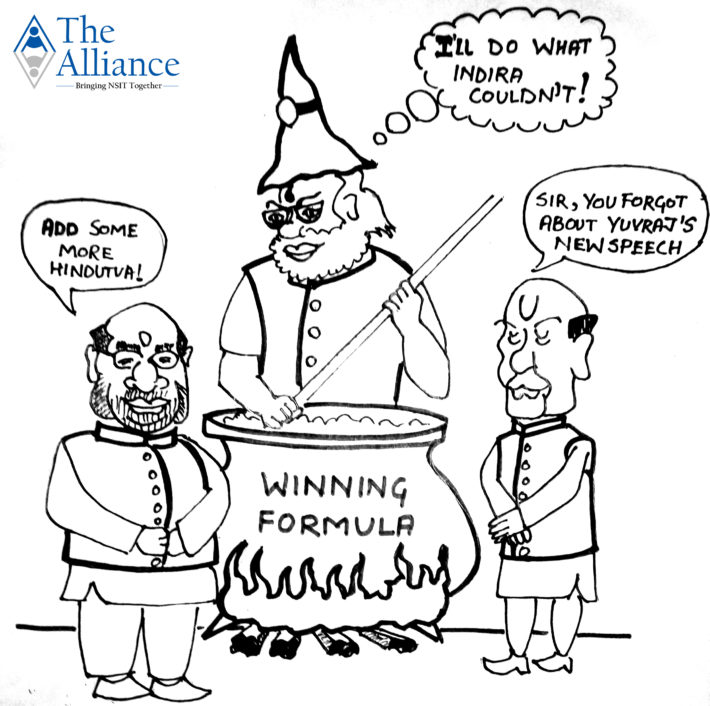By Manad Gupta, Batch of 2021
The Modi-Shah juggernaut has inevitably changed the course of India’s political situation for years to come. They have turned BJP- from India’s principal opposition party for two decades, to an election-winning machine which is always in action. BJP is now less of a political party and more of a machine whose only propaganda is nationwide presence and domination. “Congress Free India’’, the mantra of BJP helmed by Narendra Modi not only lays the foundation of an “Opposition free India” but also indicates the grim transition that India is making into a one-party republic. The party uses modern media to showcase the results of even an ordinary municipal election as national consensus over its government at the centre.
The colossal success of BJP is ascribable not just to the Modi-Shah duo but also extendable to Arvind Kejriwal’s words, the forever revolting students of JNU and to Rahul Gandhi’s unsuccessful attempts at being a politician. Congress has succumbed to the tactics of BJP and has been unable to project itself as a viable alternative to the people. Meanwhile, BJP has opened its doors to regional and national leaders from other political parties shutting a blind eye to their criminal records. With likes of Mukul Roy and Arvinder Singh Lovely joining the party, BJP now has a diverse spectrum of leaders originating from both left and right-wing parties. Ergo, BJP has exponentially multiplied its reach all over the country since every new leader that joins the party brings with himself additional funds and support base. Coupled with Narendra Modi’s dominating presence, BJP has struck gold in finding the victory recipe and has turned tides in its favor.
The larger-than-life persona of Narendra Modi, in addition to his rags-to-riches story, has created a nonpareil appeal among Indian voters. Matching his aura is an uphill task, even for popular senior politicians. Even if the party fails to get the majority in a state, BJP tactfully manages to form the government at the end of the day. Whether it is Goa in the west or Manipur in the east, BJP refuses to let go of power even if they have to send the country’s former defence minister to be the Chief Minister of a state. They are headed on an all out mission to nullify the significance of opposition and be the sole ruling party in the country.
Nitish Kumar implemented the saying, “If you can’t beat them, join them”, at an opportunistic time and helped BJP in acquiring the last opposition stronghold in the Hindi heartland of the country. The executive power is being exploited to largely saffronise all state institutions and national education curriculum. At this pace, saffronisation will eradicate the country’s opposition by the time BJP is ousted from power, if ever. BJP’s ideology stands unaltered, accounted by its deep roots with RSS. RSS already has strong roots penetrating the country and is employing BJP’s dominance at the centre to widen its reach within the society. They aim at ultimately exterminating all other opposing ideologies so that no opposition ever rises up against it; and even if it does, RSS’s influence and power is sufficient to weed them out.
Many people theorise that a one-party republic is a welcome change for India as it guarantees faster decisions, increased development, reduced corruption and efficient implementation. However, one-party republic is against the most fundamental principle of democracy. Moreover, what is the guarantee that the government will not turn a blind eye to all the advantages that a one-party republic has? Narendra Modi is not the first politician who has dreamt of governing a one-party state. Indira Gandhi’s attempt was a resounding failure due to the strong opposition she faced from all over the country at that time. Sadly, the same is not applicable to today’s scenario because of the weak and disunited opposition which prefers joining hands with BJP rather than challenging it. If we continue to trudge along this path without any deflection, India will soon resemble a bleak dystopia. The magic of the Indian democracy that was described in Salman Rushdie’s “Midnight’s Children” has been present for seven decades but it will definitely wear off. Unlike 1975, the magic will be gone forever this time.

